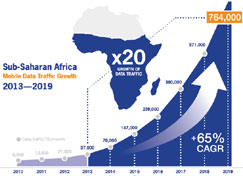Mobile data 'revolution' in Sub-Saharan Africa
10 June 2014
Voice-call traffic in Sub-Saharan Africa is expected to double and mobile internet usage to increase 20 times between 2013 and 2019 - twice the anticipated global
expansion - Swedish company Ericsson says in its latest mobility report for the region.
The rapid growth of 3G and 4G technology across the region follows the recent launch of under-$50 smartphones, Ericsson says in its June 2014 Sub-Saharan Africa Mobility report, released last week.
The popularity of social media, content-rich apps and video content accessed from
these cheaper smartphones has also contributed to the growth. Consumers in Kenya, South Africa and Nigeria are increasingly using video TV and media services from their smartphones, the report says.
Sub-Saharan Africa's mobile penetration of 70% is fast approaching the global rate of 92%, Ericsson says.
The report predicts 3G technology will become the dominant technology across the
region by 2017,
outstripping 2G to become the region's dominant form of mobile
connection.
The report predicts that 75% of mobile subscriptions will be internet inclusive
(3G or 4G) by 2019.
The company expects mobile subscriptions to increase from 551-million at the end of
2013 to more than 635-million subscriptions by the end of the year. Subscriptions will
reach 930-million by the end of 2019, the company predicts.
Data revolution
Ericsson revealed the scale of the region's ongoing data revolution with traffic growth
doubling in the past year: phone users accessed 76 000 TB (terabyte) of data a
month, double the 2013 figure of 37 500 TB a month. The figure is expected to double
again in 2015, with mobile phone users projected to access 147 000 TB a month.
Regional head of Ericsson Sub-Saharan Africa, Fredrik Jejdling says: "Sub-Saharan
Africa is currently undergoing a mobile digital revolution with consumers, networks
and even media
companies waking up to the possibilities of 3G and 4G technology.
"We have seen the trend emerging over a few years but in the past 12 months, the
digital traffic has increased over 100%, forcing us to revise our existing predictions.
"The rise of cheap smartphones will allow vast portions of the population - from
middle classes in cities to small businesses in rural areas - access to mobile
broadband.
"M-commerce can offer endless opportunities for entrepreneurs and we've found that
farmers are fans of mobile wallets, as well as teenagers wanting to watch music
videos on their smartphone," Jejdling says.
Ericsson undertakes traffic measurements in more than 100 live networks
across the world and makes predictions in collaboration with Ericsson
ConsumerLab, combining its own data with population and macroeconomic trends.
SAinfo reporter
 Infographic from the June 2014 Sub-Saharan Africa Ericsson Mobility Report showing the rate of mobile internet data growth from 2013 to 2019 (Photo: Ericsson)
Infographic from the June 2014 Sub-Saharan Africa Ericsson Mobility Report showing the rate of mobile internet data growth from 2013 to 2019 (Photo: Ericsson)




